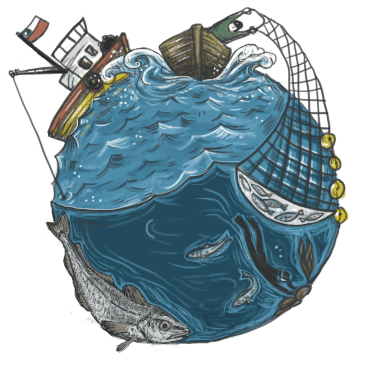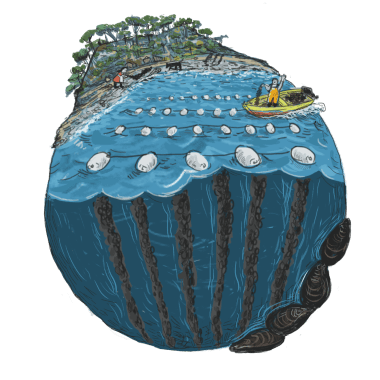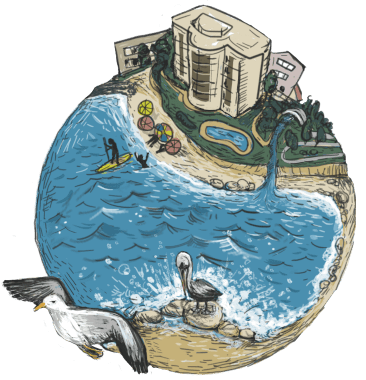
Social-Ecological Systems
The term Social-Ecological Systems (SES) arises from the need to understand the complex interactions between human communities and natural ecosystems over time, recognizing that human activities have profound impacts on natural resources and the stability of the ecosystems they rely on.
The concept presents a key foundation: that “the division between social and natural systems is artificial and arbitrary.” In this framework, the social refers to the human dimension in its various facets, including economic, political, technological, and cultural aspects; and the ecological refers to the thin layer of the Earth where life exists — the biosphere (Folke, 2016).
Thus, the social-ecological systems approach emphasizes that people, communities, economies, societies, and cultures are part of the biosphere and shape it at both local and global scales. At the same time, people, communities, economies, societies, and cultures are embedded in, dependent on, and co-evolve with the biosphere (Clark and Munn 1986, Folke et al. 2011, Leach et al. 2012).
For example, a common issue related to social-ecological systems in artisanal fisheries is the overexploitation of fishery resources. Management and governance decisions can lead to the depletion of fish stocks, affecting not only the livelihoods of local communities but also marine biodiversity and associated ecosystem services such as climate regulation and food provision, among others.
In this way, social-ecological systems offer a comprehensive framework for addressing complex problems, such as the sustainable management of natural resources and the adaptation of human communities to environmental change, highlighting the close relationship between social and ecological dimensions.
Key concepts
In the study of social-ecological systems, several key concepts help to understand the complex dynamics between human communities and natural ecosystems:
1. Multiple stressors: This refers to the various factors or forces that exert pressure on a social-ecological system. These can include climate change, urbanization, pollution, changes in technology, public policies, changes in management practices, among others. Multiple stressors interact in complex ways and may have cumulative or synergistic effects on the system, affecting both social and ecological components.
2. Sustainability: This is the capacity of a social-ecological system to remain in balance over time, ensuring the satisfaction of present human needs without compromising the ability of future generations to meet their own needs. In the context of social-ecological systems, sustainability involves managing natural resources in a way that ensures their renewal and minimizes negative impacts on the environment and human communities.
3. Global change: This refers to significant and large-scale changes in the climate system, ecosystems, and environmental processes that are currently occurring as a result of human activities, such as the burning of fossil fuels, deforestation, urbanization, and industrialization. These global changes have profound impacts on social-ecological systems, altering species distribution, climate patterns, the availability of natural resources, and the livelihoods of human communities.
4. Adaptación: This is the ability to adjust or respond effectively to the changes and challenges faced by a social-ecological system. In the context of global change, adaptation involves developing strategies and policies that enable human communities and natural ecosystems to face and mitigate the negative impacts of environmental and social changes. This may include changes in resource management practices, the implementation of resilient technologies, the creation of adaptive management policies, and the promotion of community resilience.
5. Co-production: One of the earliest uses of the term “co-production” was by researchers Elinor and Vincent Ostrom in the 1970s, to describe how public services were not only delivered by government agencies to society in a one-way flow, but were instead a shared and collaborative product of society as a whole.
Ostrom introduced the idea of citizens as “co-producers of public services,” to show that the delivery of basic public services, such as public safety, depended both on the police — to investigate crimes and detain suspects — and on citizens — to report crimes and share information — in a bidirectional process of exchanging experiences and knowledge.
The application of this form of knowledge production thus emerged as a response to the complexity and social relevance of emerging challenges, such as environmental problems, economic development, and social distress. In this way, co-production is context-based, problem-centered, and requires the participation of multiple disciplines and types of knowledge (Norström, 2020).
Thus, in social-ecology, these concepts emphasize the critical interdependence between human actions and natural systems, and the need to address environmental and social challenges in an integrated and sustainable manner, integrating knowledge to ensure the well-being of present and future generations.
.
SECOS Social-Ecological Systems

Small scale fisheries
Adaptive capacity and payment for ecosystem services in territorial systems of exclusive rights.
Ecosystem management and polycentricity in fishing policies.
Rights of indigenous peoples, associated with environmental justice and equity policies.
SES coordination: Rodrigo Estévez, Loretto Contreras-Porcia

Shellfish aquaculture
Shellfish aquaculture, associated with multiple environmental forces and adaptive capacity.
Small-scale aquaculture, focused on socio-cultural factors that drive change and innovation.
SES coordination: Cristian Vargas, Bernardo Broitman.

Coastal development
Tourism, mainly associated with social and ecological tradeoffs, and synergies between mega-development and small businesses.
Interactions between fresh water and salt water (land-sea), mainly the impacts of emerging projects, such as water highways and desalination plants and their biogeochemical consequences.
SES coordination: Carolina Martínez, Felipe Vásquez.
The Artisanal Fisheries SES seeks to contribute to transitions toward sustainability by understanding drivers of change, regulatory compliance, the social-ecological conditions that hinder sustainability, and the implementation of actions that enable the co-production of alternative pathways toward sustainable management.
This research line has been developed through three main Learning Platforms (LPs). The first LP focuses on sustainability, equity, adaptive capacity, and ecosystem services associated with territorial use rights policies that are co-managed by artisanal fishers. Strong relationships between SECOS and fisheries associations have been key to advancing in these areas.
The second LP analyzes the role of polycentric and multi-stakeholder fisheries policies as enabling conditions for just, sustainable, and ecosystem-based management of fish, invertebrate, and algae fisheries. Within this framework, SECOS has also explored associations with local councils and the restocking of marine species.
The third LP addresses coastal resource use rights by Indigenous communities, exploring the role of policies, environmental drivers, and tensions between different knowledge systems.
The Shellfish Aquaculture SES, in turn, seeks to advance the study of shellfish and small-scale aquaculture by understanding the social and ecological drivers of change at multiple scales and implementing actions that promote sustainability and adaptive capacity within the aquaculture sector.
This research line is developed through two main LPs. The first LP focuses on shellfish aquaculture and the multiple environmental stressors it faces, such as ocean acidification, ocean warming, deoxygenation, and pollution, as well as on adaptation strategies. This LP addresses mussel and scallop aquaculture in southern and northern Chile, and has achieved significant progress through close collaboration with scientific institutions and the productive sector.
The second LP centers on small-scale aquaculture, exploring the sociocultural drivers of change, innovation processes, and the role of public policy.
Finally, the Coastal Development SES addresses the study of social-ecological systems (SES) in coastal zones, with the aim of reframing and guiding coastal development toward a revaluation of the natural functions and environmental values of marine landscapes.
The first LP focuses on coastal tourism, ecosystem services, and spatial planning. In this area, SECOS has achieved close interaction with coastal tourism stakeholders.
The second LP explores interactions between freshwater and seawater and their implications for planning, biogeochemical cycles, and public policy. This includes the study of geomorphological and hydrological modifications and their impact on sediment and contaminant transport, salinity gradients, and nutrient and gas fluxes.
The third LP focuses on the vulnerability, adaptive capacity, and resilience of coastal communities, as well as on the interactions between the ocean and terrestrial territory.


